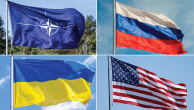Introduction and Summary
The public’s strong commitment to the use of military force in retaliation for the Sept. 11 terrorist attacks is predicated at least in part on the idea that a good offense represents the best defense. By 44%-33%, Americans think that taking military action abroad to destroy global terrorist networks is more important than building up defenses at home to prevent future attacks.

At the same time, the public’s reliance on force as a deterrent is greater than its desire for revenge. A solid majority (57%) believes that engaging in military action to stop future attacks is a more important motivation than avenging the attacks in New York and Washington, D.C. Still, nearly eight-in-ten think that punishing terrorists is an important reason for using military force.
These are the findings of the latest nationwide survey by the Pew Research Center, conducted Sept. 21-25, which shows broad public confidence in the success of a military operation, but also a fair degree of uncertainty about the mission. The vast majority of Americans have at least some confidence that the United States can destroy terrorist networks around the world — but only 39% are very confident this can be achieved, while nearly as many (37%) are somewhat confident. This compares with 61% who felt very confident in the success of the U.S. military action against Iraq, shortly before the Persian Gulf War in January 1991.
Men, whites, and Southerners are much more likely than others to express strong confidence that military action will succeed. These historically hawkish groups also tend to give higher priority to taking military action abroad than to bolstering anti-terrorist defenses at home.
Public uncertainty is also voiced over the timing of military action. While the public is largely resigned to the fact that a long campaign will be needed to defeat terrorism, there are mixed views as to whether it is more risky to strike too quickly, or too slowly. Nearly half the public (49%) says the larger concern is that the administration will delay taking military action, while 34% worry that the administration will move too quickly. Those most confident of victory — conservatives and men — are more concerned about waiting too long.
The poll continues to find extraordinary levels of national unity and support for President Bush. Satisfaction with the state of the nation has climbed in spite of the attacks and the continuing economic downturn. However, a sizable minority (33%) says that U.S. mistakes in dealing with other nations may have motivated the attacks. When that line of thinking was further examined using alternative question wording, 21% of respondents cited U.S. unfairness to other countries as a motivating factor for the attacks, while as many as 48% say that insufficient toughness in U.S. foreign policy may have contributed to the attacks.
Fewer Very Confident than Before Gulf War

Overall, there are many signs that Americans are ready to see the U.S. strike back against terrorist organizations. Polls show solid support for military action, including the use of ground troops, to retaliate against whoever is responsible for the terrorist attacks (see the Pew Research Center’s “American Psyche Reeling from Terror Attacks,” Sept. 19, 2001). And the vast majority of Americans (76%) are at least somewhat confident that U.S. forces will be able to complete their mission to destroy terrorist networks around the world.
But there are differences among groups in the strength of that confidence. And far fewer Americans express a great deal of confidence in the struggle against terrorism than did so a decade ago in the war against Iraq.
Just before that war began, 61% said they were very confident in the “capabilities of the American military forces in the Persian Gulf” to prevail in the war against Iraq. Today, just 39% express a high degree of confidence in the ability of U.S. forces to destroy terrorist networks around the world.

Republicans are far more confident in the nation’s ability to destroy terrorist networks than Democrats. Fully 89% of Republicans have at least some assurance that U.S. forces will prevail, with 50% very sure of victory. Seven-in-ten Democrats feel at least somewhat confident that terrorism can be defeated, and just 30% are highly confident of victory. About one-quarter of Democrats are doubtful that this is a battle that can be won, compared with one-in-ten Republicans.
Men are more firmly confident in the effectiveness of military action (46% very confident) than women (33%). Education is also a factor in people’s confidence about the military mission. More than four-in-ten (42%) of those who never attended college feel confident that U.S. forces will be able to complete their mission, compared with 33% of college graduates.
There is more confidence about the effectiveness of military action in the South than any other region. Fully 47% of Southerners feel very confident that terrorism can be eliminated, with another 34% somewhat confident. By comparison, fewer than four-in-ten respondents in other regions feel very confident about victory.
Those who are the most worried about becoming the victim of a terrorist attack are the least optimistic about the effectiveness of military action. Among those who have little or no fear of terrorism affecting them directly or indirectly, 44% have full confidence that military action will succeed in eliminating terrorism. By comparison, just 32% of those who are very worried that they or someone in their family might become a victim of a terrorist attack agree.
Minorities are more skeptical than whites about the possible success of military action. Fully 39% of African-Americans are doubtful that U.S. forces can destroy terrorist networks, though 57% have at least some confidence. Just 17% of whites have doubts, while 80% express at least some confidence.




